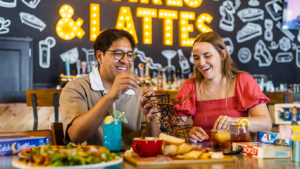It’s a joyous time of year where, under normal circumstances, families would gather around the dining room table, come together to enjoy one another’s company, feast on delicious recipes and embrace family traditions. However, it could be especially difficult to manage diabetes during the holiday season when rich, sugary, and salty foods seem to be everywhere.
The holidays also come with heaping amounts of stress, especially this year with COVID-19 restrictions, which are preventing families from celebrating as usual. It is important for people that have diabetes to continue making healthy choices, especially since mounting evidence suggests COVID-19 places people with Type 2 (and possibly Type 1) diabetes at a higher risk for severe illness and death, according to the Centers for Disease Control and Prevention.
Dr. Amar Kapur, primary care physician with 4C Medical Group, part of OptumCare, explains that people with diabetes – especially those with uncontrolled diabetes — face a higher chance of experiencing serious complications from COVID-19 because their body’s ability to fight off infection is compromised.
The holiday season may pose a risk for the more vulnerable population but using the below guidelines can help ease the stress of keeping diabetes under control during this unprecedented time.
Here’s a Diabetic’s Guide to Safely Celebrating the Holidays:
1. Prepare your body
Dr. Kapur recommends staying active! While older adults currently have limited options to participate in community activities, it is still important to stay as active as possible through home exercise. Exercise is an important part of controlling glucose levels, managing diabetes, and creating less vulnerability to infection. Lack of exercise makes it harder to control glucose levels and stay motivated to continue eating healthy.
Some options to consider:
• Engage in at-home workouts in order to avoid physical contact with others
• Take a walk around the neighborhood (ensure proper social distancing on sidewalks).
• Dance to uplifting music
2. Eat healthy and smart
Older adults are still advised to stay at home and socially distance as much as possible, which can make it easier to snack more frequently. Not to mention, during the holiday season, there are more delicious and specialty dishes that are not classified as ‘healthy,’ which can lead to climbing glucose levels.
Dr. Kapur recommends home cooking at all times. Home-cooked meals have lower levels of sodium, sugar, and fat when compared to meals at a restaurant. He also recommends avoiding high-carb snacks as much as possible, since they can cause erratic blood sugar spikes that are not easily managed.
3. Control glucose level at-home before enjoying a feast
The methods for keeping your glucose levels under control at home are the same as they have always been. However, some patients may have to adjust to the new lifestyle changes that come along with this pandemic, so it is important to take extra steps to help you stay on track.
“Regularly monitoring your blood glucose level is a must,” explains Dr. Kapur. “It’ll help you keep track of your spikes and trends and will allow you to create an action plan in case your glucose levels become a concern.”
4. Keep track of your medication and checkups
Patients with diabetes should continue their regular checkups with their diabetes care team. Telemedicine is now available and has been great in helping older adults stay at home and away from other potential sources of infection. Telemedicine has enhanced the experience specifically for diabetic patients as clinicians can counsel patients about diet, exercise, drug regimens, and monitoring blood sugars.
5. Enforce small gathering rule or celebrate virtually
The fatigue and loneliness caused by the pandemic could lead people to lower their guard and have unsafe family gatherings. However, it is recommended to follow the CDC holidays guidelines and host virtual parties or safe gatherings with members of the same household[5].
It is also recommended that gatherings be outdoors whenever possible. If it’s necessary to be indoors, ensure there is good ventilation by opening windows or doors.




